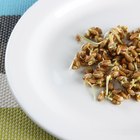
sergio_kumer/iStock/Getty Images
If you have cellulite, you are not alone. It is estimated that as many as 90 percent of women have cellulite, although men can have it, too. While getting rid of cellulite completely may not be realistic, it may be possible to prevent cellulite or diminish its appearance. The solution is inexpensive, easy, safe and natural -- drinking more water.
Cause
According to MayoClinic.com, cellulite is caused by fibrous connective cords that connect the skin to the underlying muscle. Fat cells that accumulate between the skin and deeper structures push up against the skin, while the fibrous connective cords pull down. This force creates the appearance of cellulite. Heredity and aging are the only non-modifiable risk factors for having cellulite. If your mother has cellulite, you probably will, too. As you get older, you may be more at risk for cellulite because your skin loses elasticity. However, the remaining risk factors for having cellulite are modifiable, meaning you can change or manage them. Stress, a sedentary lifestyle and the use of hormonal contraceptives may contribute to the formation of cellulite.
Symptoms
Cellulite can be unsightly. The Mayo Clinic defines cellulite as fat that appears as dimpled skin on the hips, thighs and buttocks. Thighs that have cellulite on them are commonly referred to as "cottage cheese thighs" because of their appearance. Women who have cellulite are often self-conscious, especially wearing shorts or bathing suits.
Prevention/Solution
From cellulite cream and vigorous massage to laser and radiofrequency therapy, women spend much time and money on stubborn cellulite, according to MayoClinic.com. However, drinking more water may be one of the simplest cellulite treatments available. Water works as a natural cleanser, flushing toxins out of the body. According to MotherNature.com, keeping your body's natural highways and byways clear gives cellulite an easier escape route.
Time Frame
The minimum daily recommended amount of water for an average-sized person is 64 oz., according to Home Bodies. However, the more water you drink, the better. The time it will take to see results will vary among individuals and depends on how severe your cellulite was to begin with. Your body needs to learn to trust that you will continue to drink more water on a regular basis. When your body grows accustomed to a steady flow of water, it will eliminate the excess, which can be a contributor to cellulite, because your body knows there will be a continual supply to function.
Considerations
In addition to drinking more water, eat a healthy diet and get regular exercise. You may find that an overall healthy lifestyle will be more effective in diminishing the appearance of cellulite than drinking more water alone. Be persistent and patient. Women's bodies are designed differently than men's. MayoClinic.com says that fat in women is typically distributed in the thighs, hips and buttocks. So it is only natural that women may struggle with cellulite. A realistic goal is to feel and look healthy, not perfect.
Related Articles

Which Cheeses Are Lower in Fat?

List of Water-Rich Foods

The Best Fluids to Drink With COPD

Can You Tighten Facial Skin With Cold ...

Bodybuilding and Losing Fat With Skim ...

Swimming to Tighten Loose Skin

The Benefits of Drinking Coconut Water

How Much Whole Grain Should You Eat a ...

Having Self Control in a Relationship

How to Shower When There Is No Hot Water

How Exercise Increases Hair Growth

How to Cook Frozen Dumplings With a ...

Calories in One-Half Cup of Cottage ...

Psychology of Men and Relationships

What Is the Difference Between Acuvue 2 ...

Oat Bran Vs. Wheat Germ

How Much Water Should I Drink With a ...

How to Be Independent From My Husband
How Long Can You Keep Lemon Slices in ...

How to Defrost a Sirloin Rolled Roast ...
References
Writer Bio
Currently residing in Livingston, Montana, Stephanie Berger is a Registered Nurse with a passion for preventative health. Since Berger began writing professionally in 2004, her work has appeared in "Women's World" magazine and "Forward in Christ" magazine. She holds a Bachelor of Science in nursing and a minor in Spanish for the health professions from Marquette University.
Photo Credits
sergio_kumer/iStock/Getty Images